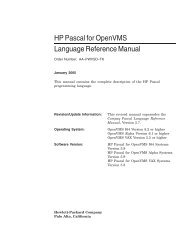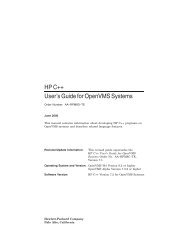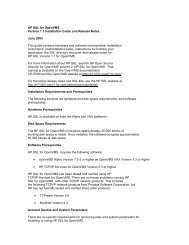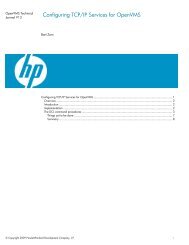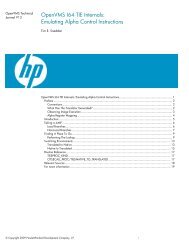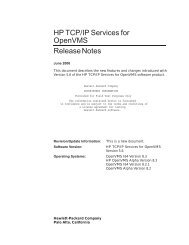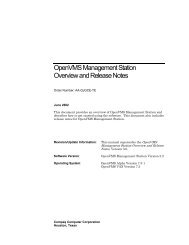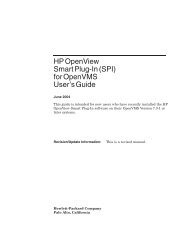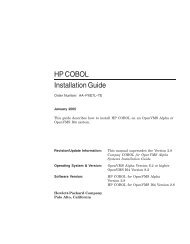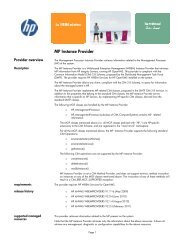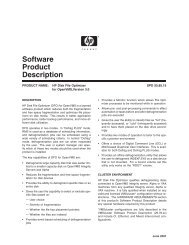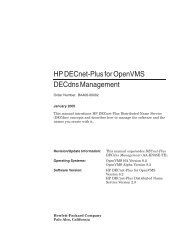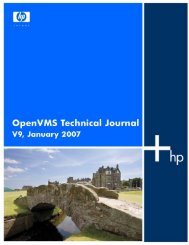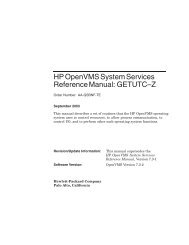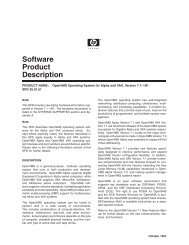HP Archive Backup System for OpenVMS Guide to Operations
HP Archive Backup System for OpenVMS Guide to Operations
HP Archive Backup System for OpenVMS Guide to Operations
Create successful ePaper yourself
Turn your PDF publications into a flip-book with our unique Google optimized e-Paper software.
3.1.12 Volume Sets<br />
Saving and Res<strong>to</strong>ring Data<br />
3.2 Catalogs<br />
only one pool per archive. If you do not specify a pool, then only volumes that have no pool<br />
defined can be used <strong>for</strong> the archive (this is also known as the scratch pool).<br />
The volume sets attribute indicates which volume sets are currently being used by save requests<br />
using the archive. There may up <strong>to</strong> the maximum saves number of volume sets currently being<br />
used. These volume sets are those <strong>to</strong> which the next save operation will be written <strong>to</strong> the archive.<br />
This attribute is normally maintained by ABS and you should not modify it unless there is a<br />
pressing need <strong>to</strong> remove one or more of the volume sets from the list and let ABS allocate new<br />
volume sets. Under no circumstances should you add volumes <strong>to</strong> the volume set list.<br />
3.2 Catalogs<br />
3.2.1 Catalog Name<br />
3.2.2 Catalog Node<br />
3.2.3 Type<br />
An ABS catalog contains his<strong>to</strong>rical in<strong>for</strong>mation about ABS save operations. This his<strong>to</strong>rical<br />
in<strong>for</strong>mation includes the location of data that was saved using ABS. For this purpose, ABS provides<br />
a default catalog named ABS_CATALOG.<br />
Some sites can operate efficiently using only ABS_CATALOG provided by ABS. However,<br />
using additional catalogs can improve your ABS operations:<br />
• Speed of record insertion<br />
• Speed of lookup operations<br />
• Segregation of saved data<br />
• Regular catalog file maintenance<br />
This name is used <strong>to</strong> reference the catalog. There are no required or ad-hoc conventions <strong>for</strong> catalog<br />
names, so they can reflect their usage in your environment.<br />
Catalogs are node specific. You have <strong>to</strong> specify the MDMS node name where the catalog<br />
resides. An empty catalog node name means the local node where the command was issued or<br />
where the request executes. In a VMScluster, multiple nodes can share the same catalogs on a<br />
common disk as long as they have direct access <strong>to</strong> the catalog files. During a save operation ABS<br />
always accesses the catalog on the local node even though a different node name is specified in<br />
the archive. During a res<strong>to</strong>re operation the catalog lookup will be per<strong>for</strong>med <strong>for</strong> the catalog at<br />
the specified node. This allows <strong>to</strong> res<strong>to</strong>re data that has been saved on another node.<br />
ABS supports four types of catalogs, which are hopefully self-explana<strong>to</strong>ry:<br />
• DISKS - This catalog type only s<strong>to</strong>res in<strong>for</strong>mation about save requests per<strong>for</strong>med. No in<strong>for</strong>mation<br />
about individual filenames are s<strong>to</strong>red in the catalog. The size of a DISKS type catalog<br />
is drastically smaller than the FILES catalog type. Save requests using this catalog type<br />
must be of type FULL and only specify a disk name. Staging does not apply <strong>to</strong> these catalogs.<br />
Selective res<strong>to</strong>re can be per<strong>for</strong>med from a DISK type of catalog using ABS.<br />
To view in<strong>for</strong>mation about saved disks use the /SAVE qualifier with the “SHOW CATA-<br />
LOG” command. The show output lists the data saved, the volume ID and save set name<br />
used.<br />
Saving and Res<strong>to</strong>ring Data 3–5



